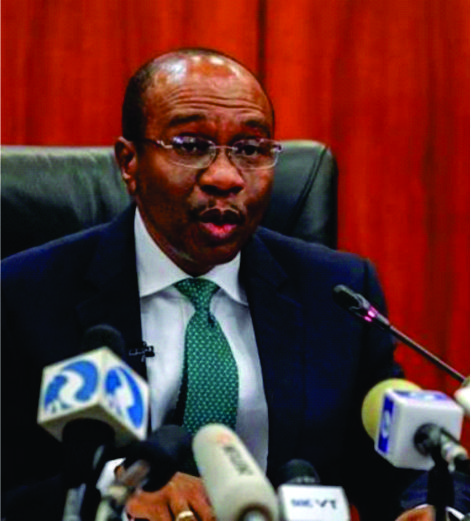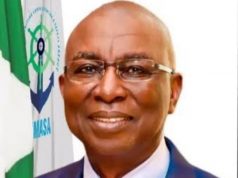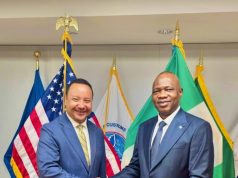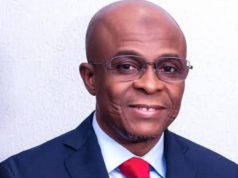story by Peace
“We have plans to address the cocoa, cassava, beef cattle, dairy, fish & shrimps sectors soonest. Soon every region of our dear country will partake and feel the positive impact of our intervention in the agricultural sector. These efforts we hope will enable us save foreign reserves for the benefit of the economy.”
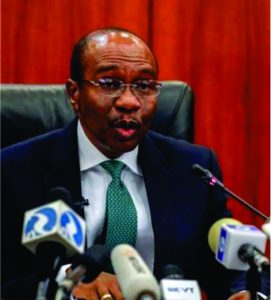 When Mr Godwin Emefiele, the former Zenith Bank Plc Chief Executive took up the mantle as the 11th CBN Chief, and its 10th indigenous governor replacing Mallam Sanusi Lamido Sanusi, whose tenure elapsed on June 1, 2014 expectations were quite high because the economic situation in the country was not enviable then. Against all odds and in the face of economic recession, high inflationary trend among others, the man Godwin Emefiele has been able to steer the ship into stability. Despite the challenges the Nigerian economy was faced with during the 2016 recession, Emefiele oversaw the
When Mr Godwin Emefiele, the former Zenith Bank Plc Chief Executive took up the mantle as the 11th CBN Chief, and its 10th indigenous governor replacing Mallam Sanusi Lamido Sanusi, whose tenure elapsed on June 1, 2014 expectations were quite high because the economic situation in the country was not enviable then. Against all odds and in the face of economic recession, high inflationary trend among others, the man Godwin Emefiele has been able to steer the ship into stability. Despite the challenges the Nigerian economy was faced with during the 2016 recession, Emefiele oversaw the 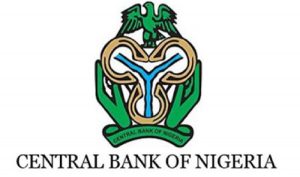 economic and recovery growth process of the economy. As at the last quarter 2018, the Nigerian economy grew at 2.38%, with inflation dropping for the third consecutive month to 11.25%. Lots of Nigerians were not surprised because the man of the moment brought to the job about 20 years of banking experience.
economic and recovery growth process of the economy. As at the last quarter 2018, the Nigerian economy grew at 2.38%, with inflation dropping for the third consecutive month to 11.25%. Lots of Nigerians were not surprised because the man of the moment brought to the job about 20 years of banking experience.
Barring last-minute changes and contrary to the popular opinion that Godwin Emefiele will be replaced as the Governor of the CBN following the expiration of his first tenor, President Buhari re appointed him for another tenure of five years. The announcement of his reappointment makes him the first CBN Governor to get a second term since 1999. Several candidates were speculated to replace Emefiele as the CBN Governor, including Aishah Ahmad, Professor Soji Adelaja, Obadiah Mailafia, and Umaru Abdul Mutallab.
In his letter of tenure extension to the senate, President Muhammadu Buhari wrote thus, “in view of the expiration of the first tenure of the current governor of Central Bank of Nigeria on June 2nd, 2019 and pursuant to the provisions of section 8{2} and [2} of the central bank of Nigeria act 2007, I hereby present for confirmation by the senate Mr Godwin Emefiele for re-appointment as Governor of Central Bank of Nigeria for a final tenure of five {5} years. It is my hope that the distinguished Senate will consider and confirm the nominee in the usual expeditious manner. Please accept Mr Senate president the assurance of my highest regards” he concluded
God willing, by the time he completes his second five years in office, he will become the second longest serving CBN Boss in Nigeria history after the (Late) Alhaji Abdulkadir Ahmed who Served From: 6/28/1982 to 9/30/1993
Calling our memory back to history, it could be recalled that, (Late) Roy Pentelon Fenton Served From 7/24/1958 to 7/24/1963, (Late) Alhaji Aliyu Mai-Borun Served From 7/25/1963 to 6/22/1967, (Late) Dr. Clement Nyong Isong Served From 8/15/1967 to 9/22/1975, (Late) Mallam Adamu Ciroma Served From 9/24/1975 to 6/28/1977, (late) Mr.O.O Vincent Served From 6/28/1977 to 6/28/1982, (Late) Alhaji Abdulkadir Ahmed Served From 6/28/1982 to 9/30/1993, Dr Paul A. Ogwuma .OFR Served From 10/1/1993 to 5/29/1999, Chief (Dr) J.O Sanusi CON Served From 5/29/1999 to 5/29/2004, Prof Chukwuma C. Soludo CRF Served From 5/29/2004 to 5/29/2009, Mallam Sanusi Lamido Sanusi (CON) Served From 6/3/2009 to 6/2/2014
Obviously, his reappointment could said to be on merit because, the five-year tenure of Godwin Emefiele as Central Bank of Nigeria (CBN) Governor will forever remain memorable in the minds of Nigerians as the former managing director of Zenith Bank unarguably brought over three decades of both theoretical and practical experience from top-flight academic and hands-on banking arena to set the pace in central banking.
Dr Emefiele was actually appointed by the former Nigerian President Goodluck Ebele Jonathan, precisely on June 3, 2014 and he never wasted time to outline his 10-point agenda at a maiden world press conference in Abuja. He provided insight into his days ahead at the bank which demonstrated how prepared he was for the job. Until his appointment at CBN, Emefiele had traversed the length and breadth of Nigeria’s banking and financial services industry generally.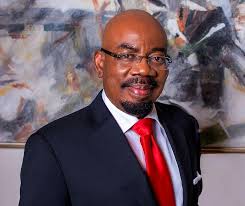
In a speech while receiving an award of Doctorate Degree of Business Administration (Honoris Causa) at the 47th Convocation Ceremony of the university in Nigeria, Nsukka recently, Mr Jim Ovia, the Chairman of Zenith Bank, attributed the excellent performance of Godwin Emefiele, the CBN Governor, to his training at the University of Nigeria, Nsukka “In my role at the helm of one of the leading financial institutions in the country, I have had the privilege of meeting several alumni of this great university. I can attest that this university is indeed a training ground for capable, committed, and compassionate change agents, having witnessed firsthand, the quality of a product of this institution, in the person of Dr Godwin Emefiele, who was the Chief Executive Officer and Group Managing Director of Zenith Bank Plc., between July, 2010 and May, 2014. As the present Governor of the Central Bank of Nigeria, Godwin Emefiele’s performance and current results arguably puts him as the best Central Bank Governor in the history of Nigeria” he concluded
While few school of thought believe that the role of the Central Bank is to deliver price and financial system stability, Emefiele believes in the pursuit of both price and financial system stability as well as provide complementary developmental functions by creating an enabling environment for Nigerians to live better and more fulfilled lives. To him, championing policies that promote the sustainability of Nigeria’s hard-earned macroeconomic stability is key. He has largely followed this up throughout his tenure. He gave robust support to the agriculture and manufacturing sectors to jump start the economy.
A lot of his admirers are not surprised because, he is used to big shoes in the past. Aside serving as the Chief Executive officer and Group Managing Director of Zenith Bank Plc, Godwin Emefiele who had been on the management team of Zenith Bank since inception was Deputy Managing Director of Zenith Bank from 2001 till August 2010 when he was appointed Managing Director to succeed Jim Ovia. He has equally served as Executive Director in charge of Corporate Banking, Treasury, Financial Control and Strategic Planning. Mr Emefiele has gathered about two decades of banking experience, which gained him the current position as the CBN governor.
Under Emefiele’s leadership, Zenith Bank strengthened its position as a leading financial institution in Africa, winning recognition and endorsement at home and abroad for giant strides in key performance areas like corporate governance, service delivery and deployment of cutting-edge ICT. Before commencing his banking career, Godwin was a lecturer at the University of Nigeria Nsukka and the University of Port Harcourt. He holds a B.Sc. and an MBA in Finance from the University of Nigeria, Nsukka.
As CBN Boss, he has also been highly credited for his great contributions to agriculture business in Nigeria which has recorded increased financial returns, and the Ease of Doing Business Forum in Nigeria since he assumed office, and is referred to as the Best CBN governor in Nigeria so far by many. Among the top achievements of the CBN governor are the following high ranking awards and recognition, for the policies he put in place to strengthen Nigeria’s economy particularly during the immense recession that began in 2015: Forbes’ 2017 Best of Africa Achievement Award, The Sun 2017 Public Service award, and The Silver bird Man of the Year Special Achievement Award
The apex bank under his watch oversaw Nigeria’s widely-acclaimed response to the plummeting of crude oil prices, a spiraling inflation, significant exchange rate pressures, sharp fall in FX inflows, delisting of Nigeria from the JP Morgan Bond Index, normalisation of US monetary policy, geopolitical tensions amongst global superpowers, and overall uncertainty following the historic change of Nigeria’s federal government in 2015. In particular, the bank’s policies helped Nigeria achieve milestones. One of the major achievements credited to Emefiele as CBN Governor is the opening of the I&E window and the stabilizing Naira. The stability of exchange rate in recent months appear to have improved foreign reserves despite slow inflow foreign capital flows into the Nigerian economy. Also, the monetary Policy Committee (MPC) under Emefiele recently reduced Monetary Policy Rate (MPR) by 50 point, and analysts have been critical if the reduction in MPR is enough to accelerate growth. Although, the reduction suggests that the MPC is beginning to move towards a loose monetary stance and is considering growth as a priority.
In a detailed report published in the Leadership newspaper on 10 Apr 2019 under the title Emefiele’s giant strides at CBN anchored by BAYO AMODU and BUKOLA IDOWU, it was noted that although the Nigerian economy initially showed uncommon resilience at the onset of shocks in the emerging markets, when compared with other key emerging market economies, it eventually succumbed to the strong headwinds. For the nation’s economy, the most important external factor was the drop-in commodity prices. The country’s overdependence on crude oil for over 60 per cent of government revenue and 90 per cent of its foreign exchange inflows meant that shocks in the oil market were transmitted entirely to the economy via the forex markets as manufacturers and traders who required forex to purchase their inputs as well as goods, were faced with a depleting supply of foreign exchange in the country. For example, average monthly inflows of foreign exchange into the CBN fell from over $3.4 billion in June 2014 to as low as $500 million in October 2016. The decline in foreign exchange earnings was further complicated by the foreign capital flow reversals from emerging markets due to the interest rate hike in the United States of America (USA). The impact of this decline on Nigeria’s economy was evident in the rise in the value of the US Dollar relative to the Naira and a rise in inflation due to the increase in the cost of imported inputs and goods. As a result of these external shocks, the Nigerian economy went into a recession in the first quarter of 2016. Gross Domestic Product (GDP) growth contracted for five consecutive quarters bottoming out at -2.34 percentage growth in Q3 2016. The exchange rate at the parallel market rose from N200/$ in August 2015 to N525/$ in January 2017.
According to the report, inflation also rose from nine per cent in January 2016 to 18.72 per cent in January 2017 as the external reserves fell from about $31 billion in April 2015 to $23 billion in October 2016, and activities in the manufacturing sector witnessed a lull as manufacturers struggled to get access to key inputs needed in the production process. These headwinds required an unconventional approach by the Central Bank in order to contain its effects on the Nigerian Economy and as the CBN Governor said, “additional measures would be required towards identifying productive sectors of the economy and channeling credit towards these sectors, while imposing proper monitoring and performance measures in order to ensure that the goals of increased employment and poverty reduction are attained.”
Today, the story is different. The Nigerian economy has begun to see a steering towards recovery path after years of decline of most of its industries. Factories are opening up again and many more are in the pipeline. Majorly the country is beginning to see a return of non-oil exports. Although oil still contributes a bigger chunk of the nation’s earnings, the contribution of it to the Gross Domestic Product (GDP) remains low as the economy advances. Exports from Nigeria rose from 23.9 per cent year-on-year to N1.733 trillion in December 2018, boosted by higher sales of crude oil which was up by 22 per cent. The export of agricultural goods had risen by 108.9 which was mostly sesame seeds, while exports of manufactured goods, raw materials and energy goods grew by 5.9, 15.5 and 4.9 per cents respectively. This is reflective of the various steps that had been taken to ensure that the economy is revitalized. After five quarters of uninterrupted GDP contraction (beginning from 1st quarter of 2016), the economy exited from the recession during the second quarter of 2017. The recovery has been sustained for seven consecutive quarters though fragile. The pace of quarterly GDP growth has improved from .5 percent in the second quarter of 2017 to 2.38 percent in the fourth quarter of 2018. The short-term outlook continued to strengthen with average growth projections of about 3 percent for 2019, up from 1.81 percent in 2018.
Continuing, the recovery has been driven largely by improved non-oil activities especially the agriculture sector which expanded consistently by about 3.5–4.3 percent (even during the recession), reflecting government’s efforts at diversifying the economy. This was nonetheless, reinforced by the pickup in the oil sector as oil prices rallied in 2017. The gradual re-orientation of the economic structure towards the agriculture sector reflects the diversification drive of the government which was supported by the development finance initiatives of the CBN.
Experts further said that due to the implementation of a tighter monetary policy regime by the CBN and improved FX inflows as a result of the introduction of the I&E window, inflation began to decline, from its peak of 18.7 percent in January 2017; it currently stands at 11.31 percent as at February 2019. Interestingly, for the first time during a general election cycle, Nigeria’s inflation rate declined from 11.37 percent in January 2019 to 11.31 percent in February 2019, due to CBN’s measures aimed at containing liquidity and supporting improved production of staple food items.
Also, since the establishment of the I&E Window in April 2017, Nigeria’s economy has recorded about US$35 billion in autonomous inflows through this window alone. As a result, exchange rate pressures eased considerably across all markets as the rates converged to about ₦360/ US$ and the distortive premium almost eliminated. At the BDC segment, there has been a significant appreciation of the Naira from over NGN525/US$ in February 2017 to about NGN360/US$ today. Rates at the I&E window also appreciated from nearly NGN382/US$ in May 2017 to just over NGN360/US$. In addition, exchange rate pressures normally witnessed during general election cycles appeared to have abated in February 2019, as the exchange rate remained stable at N360/$ during and after the general elections. At the height of drop in crude oil prices, Nigeria’s FX Reserves had declined to US$23.7 billion in October 2016. With the implementation of measures by the CBN, the stock of the nation’s external reserves has recovered steadily and has risen to US$44.8 billion as at March 19, 2019. The CBN also introduced a demand management approach in order to conserve Nigeria’s reserves by analyzing the nation’s import bill and encouraged manufacturers to consider local options in sourcing their raw materials, by restricting access to foreign exchange on 41 items, which we later increased to 43 items.
In line with its import substitution ideology, the CBN had removed 41 items from the eligible for foreign exchange list, making it quite hard for importers of such goods to source foreign exchange and forcing them to revert to local sources. The items removed from the list ranged from margarine, palm products, meat, vegetables, poultry, incense, wood, enamelware, steel, kitchen utensils, textiles, furniture, plastic, soap, tomatoes, toothpicks, cement and rice amongst others.
These are products that were abundant in the country and which the country could have comparative advantage if well explored. While the policy had sparked outrage amongst some people, many Nigerians have begun to benefit from the policy.
The several policies of the CBN had also seen activities in the manufacturing sector also witness significant improvement between August 2016 and February 2019, as the Primary Manufacturing Index rose for 23 consecutive months, from a low of 42 points in August 2016 to 57 points in February 2019.
This development was attributed to sustained supply of foreign exchange and stability of the naira. Due to the dogged implementation of the forex restriction on certain items, the country has recorded spectacular improvements in domestic production of most of these items. Local manufacturers are reporting major boosts to their revenue and profit due to the policy.
Some weeks back, the CBN had taken a step further in revitalizing the economy. Emefiele had met with stakeholders in the Cotton, Textile and Garment sector where he announced some policy measures meant to address the loss of over $2 billion on textile importation annually. These measures included the reinforcement of the ban on the use of forex from official sources to finance import of textiles.
The CBN had commenced measures to deny importers of textile the use of the financial system in Nigeria to carry on trade and had agreed that textile manufacturers can import cotton for this year but must by 2020 have backward integration arrangements to produce cotton to feed their facilities.
There was also an agreement to fast-track the financing of 100,000 cotton farmers in 2019 farming season to meet the needs of our ginneries while efforts are being made to ensure that cotton seeds are produced locally to meet domestic demand for planting purposes. These measures have started bearing fruit with enquiries by various stakeholders and serious investors.
Asides this he said “we have plans to address the cocoa, cassava, beef cattle, dairy, fish & shrimps sectors soonest. Soon every region of our dear country will partake and feel the positive impact of our intervention in the agricultural sector. These efforts we hope will enable us save foreign reserves for the benefit of the economy.
Many Nigerians said there is no doubt that reasonable measure of success has been achieved in the last five years by the CBN. They however say there is need for consolidation of these achievements particularly at a time like this, when revenue to meet budgetary obligations is still a big issue. Stability at the helm of affairs is critical.
Before his banking career, he was a lecturer in Finance and Insurance in two Nigerian Universities University of Nigeria Nsukka and Porharcourt. Mr. Emefiele holds degrees in Banking and Finance from the University of Nigeria, Nsukka, and is also an alumnus of Stanford University, Harvard and Wharton Graduate Schools of Business where he took courses in Negotiation, Service Excellence, Critical Thinking, and Leading Change.
In a broader perspective, the CBN Governor is expected to advise the president on both fiscal and monetary policies from time to time. Aside from this, the CBN Act of 2007 stipulates that the Governor is expected to formulate, for the approval of the Board, general rules and any subsequent amendments.
Specifically, the amendment Decree No.41 of 1999n on the reappointment of the CBN governor states:
“Notwithstanding subsection (1) or (2) of this section, the President may
extend the tenure of office of the Governor, any Deputy Governor or any
other Director of the Bank whose term of office has expired until a successor
to such Governor, Deputy Governor or Director is appointed.”



